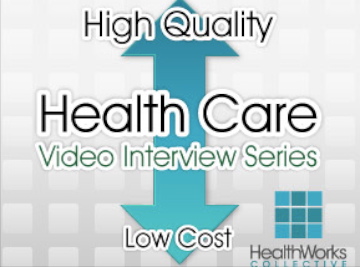
Last week, we listened to David Wong talk about SnapHealth – the Go-To place to shop for physicians. This week, Casey Quinlan, author of Cancer For Christmas, comes to us from Richmond, Virginia, to raise the question, “HOW MUCH IS THAT?” Casey is an ePatient, activist, social media enthusiast, writer, and advocate of cost transparency in healthcare. Founder and CEO of MightyCaseyMedia, Casey works with clients to tell their story. And Casey is telling her story too – loud and clear! Join the movement and question medical costs by always asking, “HOW MUCH IS THAT?”
To see other videos in this series, please go to this page. And if you have a story to tell that can reduce healthcare costs and raise quality of care, please comment below or email me at joan@socialmediatoday.com Thanks!
Video transcript (by TranscriptionStar)
Joan: Hi. I’m Joan Justice of HealthWorks Collective and I’m here with Casey Quinlan Founder and CEO of Mighty Casey Media and author of Cancer For Christmas, speaker, activist and cancer survivor. Casey has definite ideas on how to reduce healthcare cost and maintain patient satisfaction so I’m just going to let her talk.
Casey: Hi Joan thanks for the opportunity. The first thing I want to bring is a really big question in healthcare. Do you know what the really big question in healthcare is? Have you ever heard it? It’s called how much is that? No one ever asked that question how nuts is it that the biggest consumer facing industry in the United States one that touches every single human being in our country and in every other country around the planet healthcare has no pricing transparency in this country.
If you go into a doctor’s office or into a testing facility or into a hospital and say how much is that? They come, they look at you like I have no idea, and that’s not a great way to run a railroad or a hospital or a medical practice or a testing facility or your life, so I encourage people to think in terms of their own pocket books when they’re making healthcare purchases because it a purchase we have granted. I’ll say right away that if you get hit by a bus and wind up in the ER that is not the first place to say how much is that because you’ll likely be out called [Phonetic] [0:01:50] anyway so you won’t noticed.
But in your usual path and passage through the healthcare system which I like into a carwash by the way and when you go to the carwash number one you know how much it is, and number two you stay inside the car. Now, if you don’t know how much it is and you get strapped to the hood you can think about how that would work out for you, lots of soap and lax [Phonetic] [0:02:15] up the nose and those worldly tell things they got art, they got art so asking how much things cost will drive down the overall cost of healthcare because it will encourage the doctors hospitals testing facilities etcetera labs pick one to actually know what the cost is, and it will also encourage them to share that information with us.
Now, adding complexity to this issue is the fact that healthcare cost are related to insurance. Now, imagine if you will, you go into a supermarket and you go in isles and isles of food everything you ever needed, and you have your list, but not a single in that store has a price on it, so you go up to the meat counter and how you say well, how much is that package of chicken breast, and the guy says well, I don’t know it depends. How are you paying for it? Well, that’s healthcare.
You know you asked a question how much is it? And the end answer will currently for the most part b, it depends how are you paying for it. Now, I’ll encourage anyone who is watching this to once they finish watching it go Google, search on the LA Times for a — an article that was on their business pages May 27th of this year about a woman who needed, I believe it was an MRI after colon surgery.
The colon the MRI itself was somewhere in the neighborhood 6000 in the change was what her insurance was built. Her portion of that was somewhere over $2000 and she found out only after all of this had happened that she had asked what the cash price for it would be, or was like $1500 total which was less than her copay and way less than what her insurance company was build.
A lot of the pricing that exist right now in healthcare if you ask will be based on the fact that they’re going to have this giant wad of paper that they’re going to had to fill out and forms back and forth and online and approvals and referrals and code and if anything sideways it will comes kicking back at them, and they have to put it in again.
The administrative cost alone are huge, but if you remove all of that and just say how much is that I’m paying cash which I know very well as someone who doesn’t have insurance and pays cash for everything that I buy in healthcare. How much is that I’m paying cash and I’ll only deal with companies and doctors and etcetera that can answer that question. So how much is that, that’s the question. Start there, well fix the whole system.

